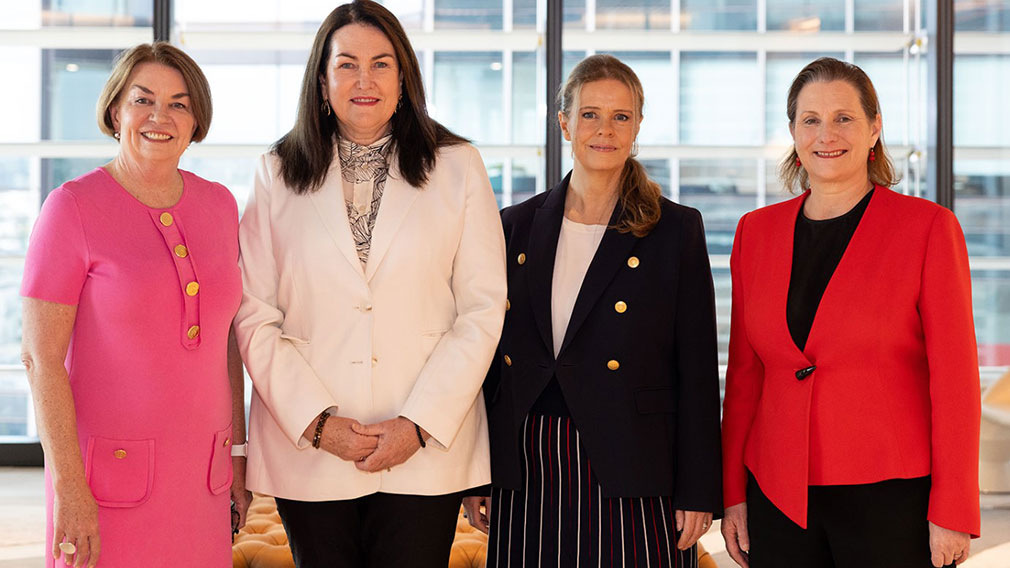Old mattresses spring new life
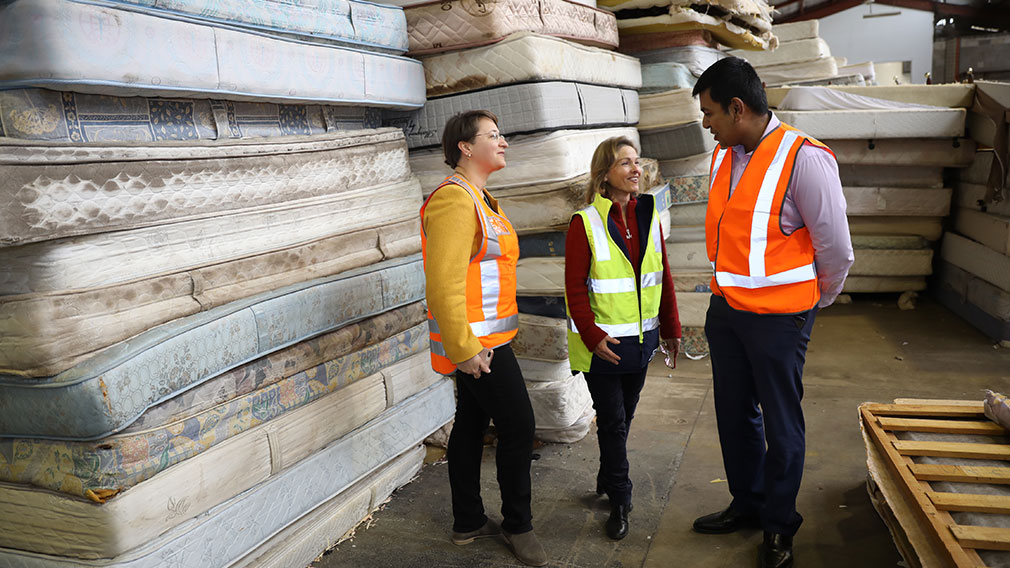
Janelle Wallace (centre), who leads the Soft Landing Mattress Product Stewardship Scheme, with Westpac Social Innovation CoLab participants Jadwiga Kovse and Shoaib Dawood, at Sydney’s Smithfield. (Emma Foster)
In a large factory in Sydney’s west, piles of mattresses are stacked high.
But rather than awaiting delivery to new owners, teams of workers – mostly from marginalised backgrounds – are busy solving a growing problem: how to get rid of old mattresses, properly, by giving them new life.
“The scale of tonnage going to landfill is just horrendous,” says Stan Brookes, national operations manager of not for profit social enterprise, Soft Landing, which diverts mattresses out of landfill and into recycling.
As many as 1.25 million mattresses end up in landfill in Australia each year, equating to around 20,000 tonnes of steel, wood and foam – or 1 per cent of all landfill waste.
Across six sites in four states, Soft Landing collects old mattresses, deconstructs them and on-sells the components. The steel springs are recycled into building products like roofing materials, the foam and wadding into carpet underlay, and the timber is mulched.
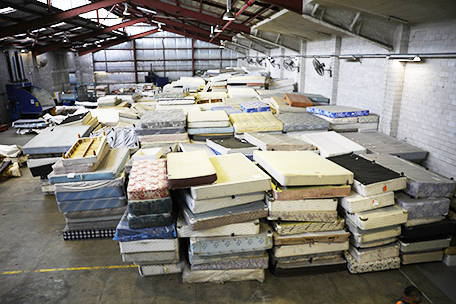
Waste mattresses waiting to be “deconstructed” at Soft Landing’s Smithfield site.
Since 2009, Soft Landing has recycled almost 740,000 mattresses, and following organic growth and the recent acquisition of the next largest mattress recycler in Australia, TIC Mattress Recycling, volumes have accelerated to around 350,000 annually.
Despite this headway, Brookes says it’s still “just scratching the surface”, and numbers will continue to increase as Soft Landing opens more sites, particularly in rural and regional areas.
The issue is also getting greater attention from government and the bedding industry as mattresses catch up to the progress made in recycling other products, such as tyres and e-waste. “Product stewardship schemes” have pushed these products along, as responsibility for their lifecycle – including their disposal – is shared by manufacturers, suppliers, retailers and end-users.
In June, a Senate committee recommended the introduction of mandatory product stewardship schemes for mattresses, among other products. If enacted, this will see Australia catch up to other countries around the world, such as France and a few states in the US, where mattress recycling is compulsory. Meanwhile, a review of the federal government’s Product Stewardship Act 2011 is due to report later this year.
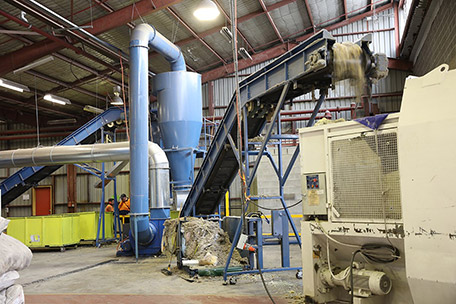
Mattress foam ready to be transported for recycling into carpet underlay.
Brookes says this shows governments are starting to understand the depth of the problem and will give mattress manufacturers and retailers more incentive to “push along” the fledgling mattress product stewardship scheme that’s been gaining momentum since 2014, with Soft Landing at its centre.
Under the scheme, manufacturers such as AH Beard, Sealy, SleepMaker, Selectopedic and Tempur, as well as suppliers and retailers like Harvey Norman, Domayne and Snooze, are working together to share responsibility for mattresses’ lifecycle, with Soft Landing managing the recycling.
“It’s a great indication that people are finally switching on to the fact that these things are a real problem for society and the environment,” Brookes says of the Senate committee’s actions. “And it’s a good thing, because ultimately it will help create a lot more employment opportunities for the long-term unemployed.”
Brookes explains that Soft Landing – initially established by Mission Australia before being acquired by social enterprise Resource Recovery Australia – has a broader underlying social purpose: its workforce of more than 80 is made up of people who face severe barriers to getting a job, such as those from marginalised communities, with a particular focus on Indigenous people.
“The whole purpose of what we do is to give people opportunities. As important as it is to keep stuff out of the ground, to me, giving people opportunities that they otherwise would not get in life, is far more important,” he says.
Watch Soft Landing employees describe how their job has affected their lives. (Tomasz Machnik\Flashpoint Labs\Westpac Foundation)
It’s this combination of environmental and social ambitions that put Soft Landing at the centre of the mattress product stewardship scheme, according to the scheme’s manager Janelle Wallace.
While significant progress has been made and recycling rates are improving, Wallace says that, like any voluntary cross-sector undertaking, a few hurdles need to be cleared before the scheme can reach its “ideal state”.
“Where we need to get to is where we are at with appliances,” she says.
“When you buy a new oven, the retailer will deliver it and take your old oven away. It just happens. Our ideal state is that when a retailer delivers your mattress, Soft Landing picks up your old one and recycles it. It just becomes expected.”
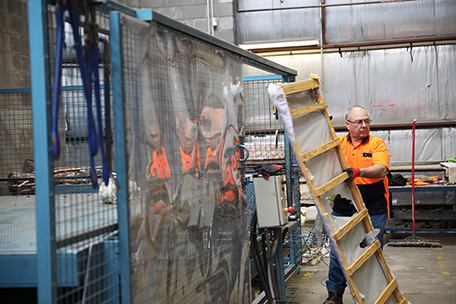
Soft Landing employee Peter Curry pulls a bed frame from the mattress stripping machine.
Wallace says the most challenging issue for scheme members is settling on a long term funding model.
“Every product stewardship program needs fair, sustainable funding to cover the costs of collection and recycling processes, as well as admin and research and development,” she says.
E-waste, for example, is managed through a co-regulatory scheme under which all major electronics manufacturers pay a recycling levy, whereas under the tyre scheme, Wallace says there’s a small levy on each tyre sold that most consumers “don’t even notice”.
“Under our scheme, we started with a membership fee on the mattress manufacturers, retailers and supply chain, but we never intended that to be for the long term. It was always intended … that we would look at some sort of ‘full pricing’ model,” she says.
Reaching a solution to this complex pricing issue – along with how to improve mattress collection logistics and raise consumer awareness – was the spark behind a pilot “Social Innovation CoLab” run by Westpac innovation team’s entrepreneur-in-residence Lise Genzo that concluded at the end of August.
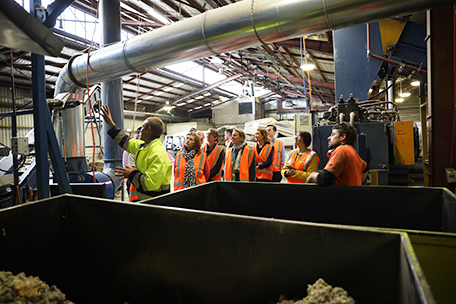
Soft Landing’s Jarrod Roskell gives Westpac Social Innovation CoLab participants a site tour.
Over the four months of the CoLab program, Genzo says twelve volunteer Westpac employees were trained in customer centred design and innovation, and formed project teams with mentors to come up with solutions to these challenges for Soft Landing, which was a recipient of a $300,000 Social Scale-up Grant from Westpac Foundation last year.
“The participants in the CoLab were so impassioned that they spent much more of their spare time on the projects and, although the CoLab has finished, they’re willing to keep at it with Soft Landing to see the solutions come to life,” says Genzo, who more typically runs innovation workshops for teams across the bank to solve banking customer problems.
Wallace says while some of the CoLab team’s recommendations, particularly around logistics, have already been implemented and are starting to deliver efficiencies for Soft Landing, others such as the proposed funding solution will now be worked through with the bedding industry. She adds that it came at a critical time for the bedding industry, which she expects to be part of the next wave of change in Australia’s waste and recycling landscape.
“It's been great for me to have a ‘brains trust’. We landed on a funding model with elements that I hadn’t thought about before, which could be very powerful,” she says.
Next time you need a mattress collected for recycling, consider booking it via Soft Landing.


